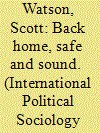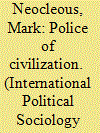|
|
|
Sort Order |
|
|
|
Items / Page
|
|
|
|
|
|
|
| Srl | Item |
| 1 |
ID:
106195


|
|
|
|
|
| Publication |
2011.
|
| Summary/Abstract |
Challenging the representations of the securitization of migration and disease as a productive broadening of security studies or as a troubling shift associated with recent developments in international politics, this article explores how the regulation of human movement and contagious disease functions to reproduce the international/domestic foundation of the nation-state system and to support the moral basis of exclusion from individual states. Drawing on the practices of border and health regulation in Canada, and specifically through the technology of insurance, the article explores how health and immigration bureaucracies and private insurance corporations reproduce the international realm as anarchic, disordered, and dangerous through the representation of certain regions and peoples as unhealthy, irrational, and dangerous.
|
|
|
|
|
|
|
|
|
|
|
|
|
|
|
|
| 2 |
ID:
106196


|
|
|
|
|
| Publication |
2011.
|
| Summary/Abstract |
This article focuses on the transnational security consultancy industry and its delivery of elite rescue services across the globe's most hostile regions. It charts the evolution of leading firms through successive strategic alliances, from initial collaborations with the kidnap and ransom insurance sector in Latin America to more recent ventures with international providers of emergency medical assistance. While the accumulated rescue toolkit of these guardians of global mobility is primarily targeted toward protecting those affluent travelers who venture into the global south, it is increasingly also filtering back up into the global north, most specifically into the American homeland by a process of "neo-liberal (re)turn." Acknowledging recent cross-disciplinary discourse on the securitized containment of "deviant" travel, increased research attention is drawn to the deployment of sophisticated security solutions and their facilitation of the globetrotting elite.
|
|
|
|
|
|
|
|
|
|
|
|
|
|
|
|
| 3 |
ID:
106194


|
|
|
|
|
| Publication |
2011.
|
| Summary/Abstract |
This article deals with two contemporary issues: the return of "civilization" as a category of international power and the common refrain that war is now looking more and more like a police action. The article shows that these two issues are deeply connected. They have their roots in the historical connection between "civilization" and "police." Through an exercise the history of ideas as an essay in international political sociology, the article unravels the connection between these issues. In so doing, it suggests that a greater sensitivity to the broader police concept in the original police science might help us understand the war on terror as a civilizing offensive: as the violent conjunction of war and police.
|
|
|
|
|
|
|
|
|
|
|
|
|
|
|
|
| 4 |
ID:
106193


|
|
|
|
|
| Publication |
2011.
|
| Summary/Abstract |
This paper approaches the ontology of war by asking why, despite its constitutive function for politics and society, has war never been made the object of an academic discipline? Through an analysis of the relationship between war and knowledge about war, we argue that the ontology of war is such that it disrupts foundational claims of the kind necessary for conventional forms of academic disciplinarity. At the center of the ontology of war is fighting, an idea we recover from Clausewitz. A moment of radical contingency, fighting both compromises knowledge about war and forces the unmaking and remaking of social and political orders. These generative powers of war operate through the production of systems of knowledge and their institutionalization in the academy, the state and wider society. Although of existential significance for political authority, these knowledges are vulnerable to the very contingency of war that produces them. This complex of relations between war, knowledge, and power we term War/Truth. As such, an analytical framework adequate to war requires a reflexive relation to truth claims. We clear the ground for such a "critical war studies."
|
|
|
|
|
|
|
|
|
|
|
|
|
|
|
|
| 5 |
ID:
106185


|
|
|
|
|
| Publication |
2011.
|
| Summary/Abstract |
After reviewing conceptual contributions that address the blurred boundary between the war and home fronts and the complexities of contemporary political topologies in general, I turn to a reading of three artistic texts—the photomontages of Martha Rosler, Paul Haggis’s film In the Valley of Elah, and Annie Proulx’s story, “Tits-Up in a Ditch”—to analyze the war front–home front relationship. I end with some reflections on the analytic contributions of montage techniques in terms of the way they establish equivalences that revalue our perspectives on the locations and actualities (presences) of war.
|
|
|
|
|
|
|
|
|
|
|
|
|
|
|
|
| 6 |
ID:
106197


|
|
|
|
|
| Publication |
2011.
|
| Summary/Abstract |
This study explores when, why, and how the Ecuadorian state has implemented programs and policies aimed at reaching out to its nationals living abroad. The evidence shows an increasing activism on the part of the state that has intensified under Rafael Correa's administration and acquired some innovative traits; it has also translated into foreign policy actions that have placed Ecuador in a leadership role in the Andean region. The timing, motivation, and nature of those transnational policies do not exactly fit the assumptions and typologies of existing literature on the subject. The characteristics of this case, as well as some contradictions and tensions in policy content and implementation, are better explained by domestic political factors such as the nature and internal dynamics of the coalition in government, the political discourse that helped to sell and give shape to Correa's political project, and the serious institutional instability and fragility in which an ambitious new reform of the state has been launched.
|
|
|
|
|
|
|
|
|
|
|
|
|
|
|
|
|
|
|
|
|